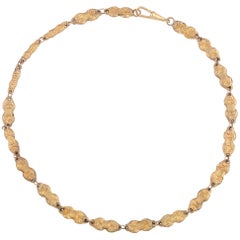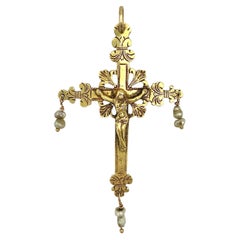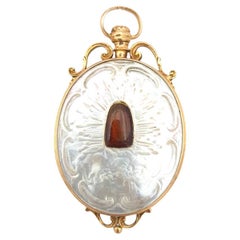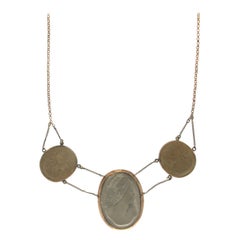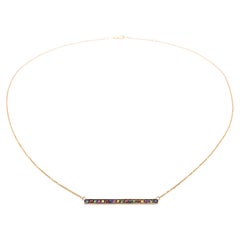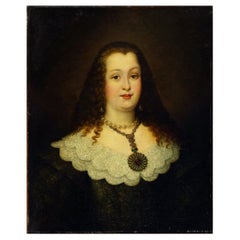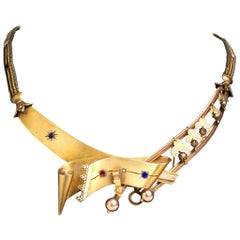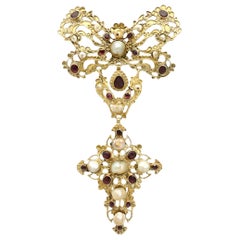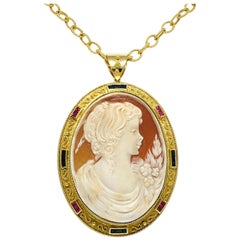Italian 18th Century Necklace
Antique Late 18th Century Italian Georgian Link Necklaces
Gold
Antique 1780s English Pendant Necklaces
Oriental Pearl, 14k Gold
Antique 1790s Italian Georgian Pendant Necklaces
18k Gold
Antique 18th Century Italian Drop Necklaces
14k Gold, Yellow Gold
Antique 18th Century and Earlier Italian Contemporary Drop Necklaces
Garnet, Ruby, Sapphire, 18k Gold
Antique 1750s Italian Paintings
Canvas
Antique 18th Century Italian Choker Necklaces
Gold
Antique Late 18th Century Italian Georgian Choker Necklaces
Garnet, Natural Pearl, 14k Gold, Yellow Gold
Antique Mid-18th Century Italian Art Nouveau More Necklaces
Ruby, Blue Sapphire, 14k Gold, 18k Gold, 22k Gold
Antique 18th Century and Earlier Italian Antiquities
Antique Late 18th Century Italian Drop Necklaces
Garnet, Natural Pearl, Pearl, Yellow Gold, Gold
Antique Late 18th Century Italian Neoclassical Pendant Necklaces
Silver
Antique Late 18th Century Italian Neoclassical Pendant Necklaces
Silver
Antique Late 18th Century Italian Pendant Necklaces
Diamond, 14k Gold
Antique Late 18th Century Italian Victorian Pendant Necklaces
Amethyst, Diamond, Gold, 14k Gold, Silver
Antique Late 18th Century Italian Georgian Chain Necklaces
22k Gold, Yellow Gold
Antique Late 18th Century Italian Baroque Pendant Necklaces
Freshwater Pearl, Onyx, 14k Gold, Gold
Italian 18th Century Necklace For Sale on 1stDibs
How Much is an Italian 18th Century Necklace?
Finding the Right Necklaces for You
We are fortunate to know much of the world’s long and dazzling history of necklaces, as this type of jewelry was so treasured that it was frequently buried with its owners. Today, Van Cleef necklaces, Tiffany necklaces and Cartier necklaces are some of the most popularly searched designer necklaces on 1stDibs.
Lapis lazuli beads adorned necklaces unearthed from the royal graves at the ancient Iraqi civilization of Sumer, while the excavation of King Tut’s burial chamber revealed a sense of style that led to a frenzy of Art Deco designs, with artisans of the 1920s seeking to emulate the elegant work crafted by Ancient Egypt’s goldsmiths and jewelry makers.
In ancient times, pendant necklaces worn by royalty and nobles conferred wealth and prestige. Today, wearing jewelry is about personal expression: Luxury diamond necklaces exude confidence and can symbolize the celebratory nature of a deep romantic relationship, while paper-clip chain-link necklaces designed by the likes of goldsmith Faye Kim are firmly planted in the past as well as the present. Kim works exclusively with eco-friendly gold, and these fashionable, fun accessories owe to the design of 19th-century watch fobs.
For some, necklaces are thought of as being a solely feminine piece, but this widely loved accessory has been gender-neutral for eons. In fact, just as women rarely took to wearing a single necklace during the Renaissance, men of the era layered chains and valuable pendants atop their bejeweled clothing. In modern times, the free-spirited hippie and counterculture movements of the 1960s saw costume-jewelry designers celebrating self-expression through colorful multistrand necklaces and no shortage of beads, which were worn by anyone and everyone.
Even after all of these years, the necklace remains an irrefutable staple of any complete outfit. Although new trends in jewelry are constantly emerging, the glamour and beauty of the past continue to inform modern styles and designs. In a way, the cyclical history of the necklace differs little from its familiar looped form: The celebrated French jewelry house Van Cleef & Arpels found much inspiration in King Tut, and, now, their Alhambra collection is a go-to for modern royals. Vintage David Webb necklaces — whose work landed him on the cover of Vogue in 1950, two years after opening his Manhattan shop — were likely inspired by the ornamental styles of ancient Greece, Mesopotamia and Egypt.
On 1stDibs, browse top designers like Dior, Chanel and Bulgari, or shop by your favorite style, from eye-catching choker necklaces to understated links to pearl necklaces and more.
